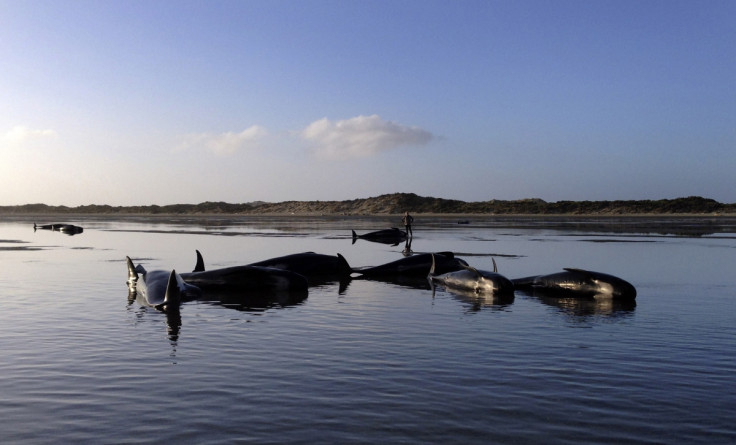Six bottlenose whales die after stranding themselves on the shore in Irish beach
The Irish Whale and Dolphin Group said this is the largest mass stranding of the species in Ireland.
Six bottlenose whales became stranded and died on a beach in Donegal, Ireland today. A group of seven northern bottlenose whales were spotted on Rosnowlagh beach earlier, with four stuck in shallow water and three others stranded and beached on the shore.
The Irish Whale and Dolphin Group (IWDG) provided first aid to the beached whales but six of them died. One was seen swimming back out to sea but the experts believe it has a very slim survival rate and could beach itself again. The group said that they will remain on shore in case the whale returns to beach itself once more.
IWDG CEO Simon Berrow said they received a call about 7-8 stranded bottlenose whales which is considered a pretty odd occurrence because these creatures are not known to live-mass strand.
"These are a very very big offshore species," he said.
"They probably weigh 3 or 4 tonnes the adult males, so they're not good candidates for refloating."
"This is the largest mass stranding of this species ever in Ireland." Berrow added.
Locals have been firing questions at the IWDG team on why they did not take action on refloating the whales or at why they didn't euthanise them. The team of experts explained that refloating would be impossible due to their size, while euthanising them would be a difficult task because of the availability and lack of chemicals in Ireland that are needed for the size of the whales.
Tide is now coming in on the live stranded Northern Bottlenose Whales. Some stranded and some still in water. All alive but stressed with high breathing rate. IWDG providing some first aid on the beach. NPWS and Donegal County Council on there way to assess situation too. pic.twitter.com/QrH2YgNBdJ
— Irish Whale and Dolphin Group (@IWDGnews) August 19, 2020
IWDG issued a warning on the spike of these animals stranding. They had recorded 245 strandings in 2019 in Ireland alone, which involved 263 animals. Most of these were caught and entangled in fishnets. The group said the deaths of these whales usually seem to happen when big commercial fishing vessels start trawling the area to catch fish.
In a report on the Science Times, researchers strongly believe that these creatures suffer from acoustic trauma that is often caused by human activity. Acoustic trauma would include specific noises from boats, and the use of radar systems in naval ships and submarines.
The noise causes a lot of distress for these animals, bringing them to a panic dive or high alert levels. Dolphins change their tunes and lower their frequency which reduces the variety of the songs they sing. Some whales are even known to stop singing altogether, which greatly affects their communication with their pods.
Ocean research has also shown that navigation systems of naval vessels cause confusion in whales and dolphins since they use echolocation for their own navigation. They would usually flee and has been thought to be a crucial reason behind whale and dolphin strandings.

© Copyright IBTimes 2025. All rights reserved.





















